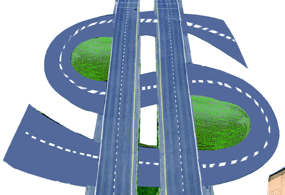Widgetized Section
Go to Admin » Appearance » Widgets » and move Gabfire Widget: Social into that MastheadOverlay zone
The Long and Short of It
There’s an old saying to the effect that a politician’s idea of “long term” is the period between now and the next election. That’s understandable; our electoral system is set up to reward folks who can front-load the goodies and postpone the pain. Immediate gratification achieved by delaying the inevitable payment is usually not in the long-term public interest—budget deficits are an obvious case in point—but try telling that to the guy who’s running for reelection.
Incurring debt to pay for non-capital items—items that should be paid for out of operating budgets—is not a new phenomenon. What is new, however, is the extent to which many of the same people who pontificate with regularity against the growth of budget deficits are enthusiastically burdening future generations by entering into other kinds of long-term transactions where the gain is up-front and the pain deferred.
As a recent article in the journal Public Administration Review wryly noted, “In the Middle Ages, the children of people who died in debt were responsible for their parents’ obligations and could be held in a debtors’ prison to ensure repayment. Today, happily, laws shield children from intergenerational debt collection. No laws stop governments, however, from borrowing and shifting the cost of repayment to future generations….One means of accomplishing this feat is the long-term asset lease.”
The PAR article centered on an analysis of Indiana’s Toll Road lease, a highly controversial privatization initiative engineered by Governor Mitch Daniels during his first term in office. The analysis concluded that “the bulk of the benefits come early and the majority of the costs arrive late in the lease.” Because such leases securitize a longer stream of revenue than is the case with revenue bonds, leases can provide a higher up-front payment than revenue bonds; as the author notes, “this can be very attractive to current decision-makers, but the higher up-front payment is possible only because more future revenue is sacrificed.”
The Toll Road lease has a 75-year term. But the State is not the only government entity willing to extend financial agreements far into the future. The City of Indianapolis recently entered into a 50-year contract under the terms of which a consortium headed by a politically well-connected vendor will manage its parking infrastructure. That contract was the subject of considerable criticism for a variety of reasons, especially its duration and the degree to which the City was ceding both future revenues and control of an important municipal function to a private company.
 In each of these transactions, a major driver was the evident lack of political will to raise tolls or parking rates. In our current political environment, any effort to raise taxes or fees in order to provide efficient service is seen as suicidal. It’s easier to let private entities raise tolls and parking fees—and much easier to let future generations pay the piper.
In each of these transactions, a major driver was the evident lack of political will to raise tolls or parking rates. In our current political environment, any effort to raise taxes or fees in order to provide efficient service is seen as suicidal. It’s easier to let private entities raise tolls and parking fees—and much easier to let future generations pay the piper.
Politicians’ rhetoric about “marketization” and the benefits of private management to the contrary, these unreasonably long-term contracts inevitably entail risks that governments ought not take.
Another example from Indiana may illustrate the danger—and remind us why we have statutes limiting the ability of government agencies to engage in speculative investments. This particular example involves a coal gasification plant currently being constructed at Rockford, Indiana.
In the early 2000s, when gas prices were high, Leucadia National Corporation proposed building a plant that would turn coal into synthetic natural gas. The idea was that the company would enter into long-term, fixed-price contracts pursuant to which it would sell that synthetic gas to utilities. The goal was eminently reasonable; the arrangement would provide the utilities with a hedge against volatility and what was then predicted to be steep price hikes. Instead, gas prices plunged, and in 2008, the utilities involved withdrew from the deal.
Indiana Governor Mitch Daniels was determined to save the Leucadia project. Insisting that gas prices will eventually rise and vindicate the state’s decision to assume a major role in the enterprise, he entered into a 30-year contract obligating the State to buy Leucadia’s gas at the above-market fixed price. Under the terms of the agreement, the State will then sell the gas to local utilities on the open market, at what will almost certainly be a long-term loss. According to The Indianapolis Star, the deal will add $1.1 billion to Hoosier energy bills over the first eight years—after that, it’s anyone’s guess. In this case, aside from a few jobs, there aren’t even front-end benefits to justify the long-term costs.
These and similar too-clever-by-half mechanisms are intergenerational transfers. Their effect is no different from the widely condemned profligacy of Congress. At best, they burden taxpayers now in diapers in order to deliver today’s services; at worst, they charge future generations for dubious or non-existent benefits. At the same time these “entrepreneurial” officeholders are piously warning us of the dangers posed by budget deficits, they are “solving” today’s problems by sending the bills to our children and grandchildren. It’s no less pernicious than running up the national debt—it’s just less visible.
Economists and public finance experts disagree about many things, but I have yet to come across a serious public finance argument urging policymakers to “buy now and charge it to the grandkids.”
Shades of the Middle Ages.
______________________________________________________________
Sheila Suess Kennedy is Professor of Law and Public Policy at the School of Public and Environmental Affairs, Indiana University Purdue University Indianapolis. Her email is [email protected]







Follow Us!